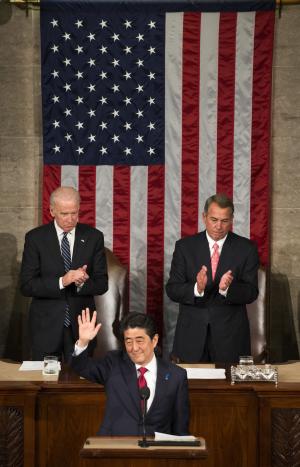WASHINGTON, April 29 (UPI) — Japanese Prime Minister Shinzo Abe drummed up support for the new Guidelines for Japan-U.S. Defense Cooperation in his address to a joint session of Congress Wednesday, and signaled a “New Japan” is ready to enter into a liberalizing trade agreement with the United States.
The prime minister’s speech, the first given by a Japanese leader before a joint session of Congress, praised the U.S.-Japan alliance for winning the Cold War and allowing Japan to grow and prosper.
But as the new defense pact goes into plan, Washington and Tokyo have agreed the U.S. military presence on the Japanese island of Okinawa will be diminished and relocated to places outside Japan.
According to Abe, Japan will provide up to $2.8 billion to help “improve” U.S. bases in Guam.
Tokyo, in turn, will expand its self-defense role in the Pacific to include deploying deterrence against potential missiles headed for U.S. territory, a historic reinterpretation of Japan’s pacifist constitution.
Without mentioning China by name, Abe stated there are three maritime principles that should be upheld in Asian waters, including compliance with international law, abstention from the use of force in making sea claims and peaceful settlement of disputes.
Recent satellite imagery of the disputed Spratly Islands in the South China Sea showed China was building a concrete runway in territory claimed by the Philippines and Taiwan.
Abe also reaffirmed his support for the Trans-Pacific Partnership, or TPP, and said the agreement aligns with his economic reform agenda within Japan. He pointed out the decline in Japan’s farming sector as an example of why “sweeping reform” is needed among Japan’s agricultural cooperatives, which have not changed in six decades.
History loomed large in Abe’s speech as he offered his “eternal condolences” for American lives lost in World War II and briefly mentioned that Japan cannot avert its eyes from suffering brought upon the peoples of Asia during that war.
“I will uphold the views expressed by the previous prime ministers,” Abe told the joint session of Congress, indirectly referring to the 1993 Kono Statement that acknowledged the Japanese military had forced comfort women to endure sexual slavery in brothels.
In 2014 Abe had ordered a panel to investigate the 1993 apology, drawing backlash from South Korea and China.

COMMENTS
Please let us know if you're having issues with commenting.